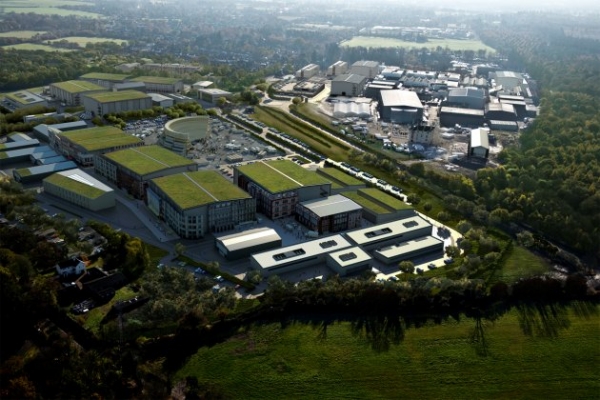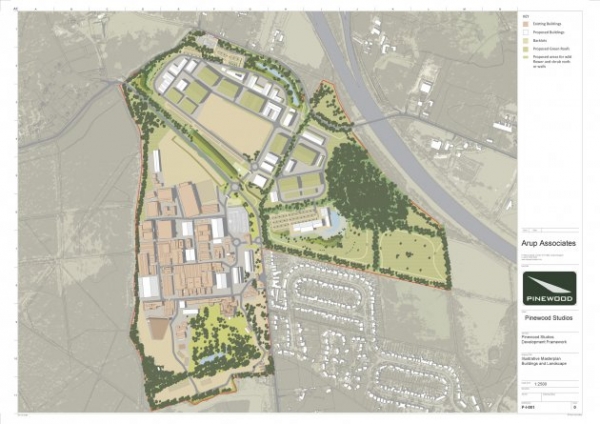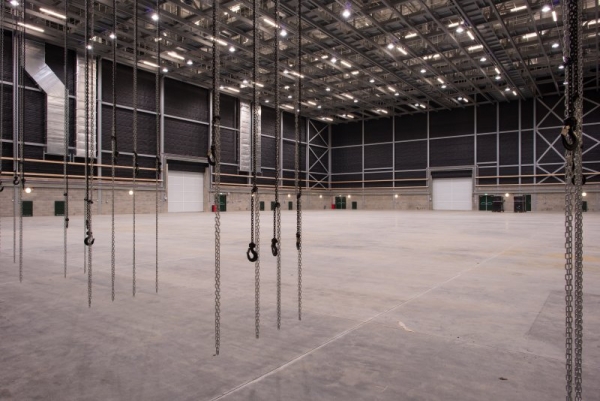SPECIAL REPORT: Pinewood Expansion: The Story So Far...
SPECIAL REPORT: Pinewood Expansion: The Story So Far...
UPDATE: Government grants permission for the Pinewood expansion. Eric Pickles, The Secretary of State for Communitites and Local Government has approved the PDSF (All the details of the PDSF below).
Ivan Dunleavy, Chief Executive of Pinewood Shepperton plc said:
"Our project builds on the success of the Government's policy for the creative industries and addresses the shortage of stage space in the UK. As a result of today's green light from the Secretary of State, thousands of much needed new jobs will be created in this growing sector of the economy. We want to begin construction as soon as possible. I'd like to thank colleagues both within and outside the industry, for the tremendous support they have given the project."
The History
On the 7th April 2014, the Planning Inspectorate delivered a report to Eric Pickles, the secretary of state for communities and local government, about the proposed expansion of Pinewood Studios.
The proposal, known as the “Pinewood Studios Development Framework” (PSDF) would see the development of an additional 30,000 sq m of stages and approximately the same amount of workshops and 34,500 sq m of production offices, not to mention a backlot.
Thousands of full time jobs could be created, but the proposal faces very stiff opposition from a resilient group of local residents. After years of legal wrangling, doomed projects, claims, counter-claims, demonstrations, PR campaigns and government intervention, the final decision on this development comes down to the Communities Secretary, currently, Eric Pickles.
Pinewood Studios sits on the edge of the village of Iver Heath, Buckinghamshire, and is just a few miles from the M25 and M40. Getting to the studios involves driving through the village, parking is limited and it is poorly served by public transport. The stages themselves stand shoulder to shoulder, with decreasing space for vehicle access and workshops.
Yet despite these niggling issues, it contains the very best technicians, service companies and facilities in the world. It’s a global leader in the creative industries, and it’s in Britain.
The biggest film production companies in the world are cueing up to get precious space in British Studios, making the most of the financial benefits and world class crews. Companies like Disney are pouring huge investment into the UK economy and creating hundreds, if not thousands of jobs in the process. The Creative Industries is one of the few sectors to experience growth during the recession.
Britain needs more space for incoming productions and development is long overdue. Warner Bros. have invested over £100m in WBSL, but there is still a need for more stages, production offices and workshops. Developing Pinewood appears to be the preference of the studios owners, the Peel Group.
This proposal (PSDF) has the capacity to generate thousands of jobs in the film and TV industry and millions into the booming creative sector and UK economy; but local opposition has fiercely fought against the Studios for several years...
This is the story so far...
2007
Work began on a proposal to expand Pinewood Studios’ capacity. The proposed site was to the north and east of the existing studios on adjacent greenbelt land. It is a former landfill on the shoulder of the M25, already owned by Pinewood Studios. The space is utilised by the local residents for dog walking and is seen as a barrier to the capital’s urban sprawl. The last time the Studios submitted a planning proposal for the same green belt land was 1979, when it was rejected by the local council.
2009
The proposal for ‘Project Pinewood’ was unveiled to the public and submitted to the South Buckinghamshire District Council.
‘Project Pinewood’ was a plan for a 100 acre site that contained permanent sets; replicas of New York streets, Venetian canals, a Roman Amphitheatre, a Medieval Castle, an LA High School and more. It was intended to be a producer’s playground that ably recreated a wide array of choices. Not only would these film sets be permanent fixtures, they would also be able to house residents; it was proposed that ‘creative people’ could actually inhabit them. 900 jobs were promised, plus 1,500 homes. It would cost £200m.
The audacious ‘Project Pinewood’ was akin to a Theme Park landing in Iver Heath, rather than a simple extension of existing facilities.
Local residents were so shocked by the plans and the impact it would have on the area, they immediately set up an opposition group called ‘Stop Project Pinewood’ (SPP). Tellingly, the opposition group still go by the name ‘Stop Project Pinewood’ today, even though the future plans were named differently. The immodest ‘Project Pinewood’ made a bad first impression and fuelled the anger of the opposition.
The nearest residential properties are in ‘Pinewood Green’ , a suburb of around 200 houses built in 1955, twenty years after the Studios began operating. The average house in Pinewood Green has three to four bedrooms and they are valued at around half a million pounds each. In a sudden burst of environmental concern, the stop campaign cited the interest of wildlife and greenbelt conservation as the prime motivations to act in opposition.
OCTOBER 2009: The plan for ‘Project Pinewood’ was rejected by the South Bucks District Council. The Chairman of the planning committee concluded that it would harm the quality of life for local residents and cause “significant degradation” of the local environment.
According to Companies House records, the rejected proposal had cost Pinewood over £7m
2010
APRIL 2010: After lengthy consideration, Pinewood decided to appeal the Council’s decision, calling for a public inquiry. It would be a year before the inquiry would commence.
2011
MARCH: The leading shareholder in Pinewood studios called upon Lord Michael Grade to resign. Richard Bernstein, who runs Crystal Amber Investment Fund out of Guernsey, describes the group’s profits as ‘average’.
APRIL: The Peel Group launched an aggressive takeover bid for Pinewood studios. Having already owned 30% off the studios group, Peel bought out £96.1m of the company shares. Peel now owned 71% of Pinewood, with Crystal Amber owning the rest.
The Peel Group are a large private real estate company owned by 71-year-old Isle of Man resident, John Whittaker. Their property portfolio is huge and includes the BBC’s new home in MediaCity Salford (below), where the corporation will pay Peel over £400m in studio and office rent over 20 years. ITV have just rebuilt the Coronation Street set at MediaCity (left of the picture) and relocated 500 staff from their former home on Quay Street.
Peel are a multibillion pound company with a huge number of subsidiaries. They boast an enviable track record in major construction projects and land ownership. The Peel website contains details of some of the large-scale projects they have completed. Their experience and expertise will be utilised over the coming years in the campaign to expand Pinewood Studios.
APRIL 2011: The Public Inquiry into the reject ‘Project Pinewood’ began. Hearings were held at the Adult Learning Centre in Evreham; in attendance were representatives from Pinewood, SPP and South Bucks Council. Inspectorate Ava Wood listened to testimony from all sides. In May, the hearings are concluded and the report is begun.
2012
11th JANUARY 2012: David Cameron visited Pinewood Studios with Culture minister Ed Vaizey MP. The Prime Minister praised the UK Film industries “incalculable contribution to culture” and called for more “mainstream” and “commercially successful” pictures.
19th JANUARY 2012: Inspectorate Ava Wood delivered the report. ‘Project Pinewood’ was finally and fatally rejected. Report HERE
FEBRUARY 2012: Pinewood submitted a new planning application to South Bucks District Council. The ‘Pinewood Studios Development Framework’ (PSDF) was a far more conservative plan than the brash ‘Project Pinewood’, but had the damage with local residents been done? This time, the influence and experience of the Peel Group’s major construction projects came to the fore.
PSDF took a very different approach. The extension was to be a typical studio set up, with stages, production offices, workshops, streetscapes and 1000 car parking spaces. The building design was more sympathetic to the local environment; the height of buildings lower than ‘Project Pinewood’, stages would have grass roofs to insulate them, softening the horizon and sightlines from the village. There would be a new access road to the studios from the 5-points roundabout, lowering traffic into Iver Heath itself.
A small area of the greenbelt land would remain between the studios and residential properties, as would ‘The Clump’, a densely wooded area. The current site (on the left of the image) is a compact arrangement of studios built periodically over 80 years. The new development, directly north and north east of the current Studios, is spread-out with better access to nearby motorways.
PSDF is a greener development and more sensitive approach to the local area. The £200m expansion would now generate over 8,000 full time jobs. Pinewood also invoked the national importance of the development, for the benefit of the Film industry and the wider economy. Ivan Dunleavy (Chief Exec of Pinewood), Danny Boyle and Ridley Scott all supported the proposals.
‘Stop Project Pinewood’ re-formed to fight back against the studio. Having won the previous battle, their case was in fact stronger as a result of the rejected application. They developed further counter arguments. On top of the environmental damage to the greenbelt land, SPP also argued that Pinewood were merely ‘landlords’ and could not protect against future development and ownership by other parties. Despite the leaders of the SPP campaign owning a haulage company based in Iver Heath, they also argued that the traffic volume through the village would increase.
APRIL 2012: The Richard Attenborough Stage was opened at Pinewood studios (2,791 sq m) - below
2013
JANUARY 2013: “UK infrastructure is creaking both in terms of skills and in terms of facilities,” according to Creative England Chief Exec, Caroline Norbury.
APRIL 2013: Chancellor George Osborne confirmed the implementation of the TV Tax Credit, allowing inward investment for large scale TV drama production. Qualifying productions must have a core budget of over £1m per hour of drama. Since being announced, Fox, Disney, Lionsgate, Starz, AMC and HBO have since taken advantage of the tax credits, investing more millions into the UK. The impact to the economy has been over £233m. Stages, production office space and technicians have been in high demand. Many jobs have been created yet the infrastructure is ‘creaking’ and the country is turning away productions willing to invest.
10th May 2013: With the PSDF planning application still under review, the Pinewood PR machine slipped into gear. The Guardian published the below article – going for the jugular of the British psyche to garner support. Ironically, the Bond franchise has ordered more international shoots than any film series ever.

10th MAY 2013: Chancellor George Osborne announced that Star Wars Episode 7 would be made in the UK.
Producer Kathleen Kennedy, president of Lucasfilm, said: "We've devoted serious time and attention to revisiting the origins of Star Wars as inspiration for our process on the new movie, and I'm thrilled that returning to the UK for production and utilizing the incredible talent there can be a part of that.
"Speaking from my own longstanding connection to the UK with films like Raiders of the Lost Ark, Empire of the Sun and recently War Horse, it's very exciting to be heading back."
Today, over half of Pinewood’s main block is now dedicated office space to Lucasfilm.
15th MAY 2013: The planning application hearing took place at 4pm on the 15th May at the SBDC. A committee of ten listened to petitions from Ivan Dunleavy, Lord Grade, The Earl of Stockton, local residents as well as district and county councillors.
Pinewood produced letters of support from Disney and Universal Studios. Vince Cable also sends a letter of support. They quote the ‘national importance’ and economic impact as special dispensation to develop the site.
At the end of a lengthy hearing the application was defeated. The vote was 6-4 against.
In a statement on the SBDC website, Chairman of the Planning Committee, Mr Ralph Bagge said:
“The Pinewood proposal is one of the most contentious and difficult planning applications that the Council has had to deal with....
Having carefully considered all the arguments for and against the proposals, the Committee was on balance of the view that to have allowed this development of over 110 acres in the Green Belt and Colne Valley Park, would not only have caused significant degradation to the local environment but also harmed the quality of life for local residents.
It is of course open to Pinewood to appeal the Council’s refusal decision and if they do so then a Government Inspector will hold an Inquiry and decide whether to support the Council’s refusal or to grant permission against the local decision”
31st MAY 2013: Pinewood decided to appeal the decision made by the SBDC, the case was taken to the Planning Inspectorate. They undertook a hearing and are to produce a report with recommendation to Eric Pickles MP, Secretary of State for Communities and Local Government. The hearing was set for November.
2013: Date unkown: Pinewood executives travelled to Scotland to explore opening a Studio. According to the Herald’s Phil Miller, a site in Glasgow was identified but had "technical" problems which could not be overcome.
JUNE 2013: Pinewood’s Dominican Republic facility opened, with a 60,500 sq ft water tank, the largest of its kind in the world. The group’s international development grew at pace; opening or planning facilities in tax friendly nations and regions.
SEPTEMBER 2013: In partnership with Curzon, Pinewood Cinema was created and promoted to local residents. On weekends, a screening room (Theatre 7) turns into a cinema showing contemporary films at affordable prices.
NOVEMBER 2013: Marvel Studios moved production of Edgar Wright’s ‘Ant-Man’ from Pinewood, London to Pinewood, Atlanta, US. Hundreds of jobs and a considerable investment were lost. Pinewood Atlanta was due to open in January 2014.
NOVEMBER 2013: A sixteen-day hearing took place to listen to the appeal. Mayor of London Boris Johnson lent his support to Pinewood. Local MP and Attorney General, Dominic Grieve, lent his support to the Stop Campaign. The Planning Inspectorate wasstill investigating.
South Bucks Council prided themselves on resisting Green belt development and Pinewood claimed ‘very special circumstances’ to develop on the land.
DECEMBER 2013: Q-Stage, a brand new studio in the centre of the existing Pinewood lot was unveiled by the actor, Ben Whishaw (who plays ‘Q’ in the 007 Franchise). Image below.
JANUARY 2014: The BFI published its annual Statistical Yearbook, showing that film production Spend for 2012 was £929m, which was down on the total of £1,274m in 2011. It is expected that film and TV drama spend will rise over the next few years, following the introduction of the TV Drama Tax Relief and Disney producing Star Wars VII and The Avengers: Age of Ultron in the UK.
17th FEBRUARY 2014: Pinewood announced an agreement with the Welsh Government to advise on a £30m fund for a new studio facility near Cardiff and the promotion of Cardiff as a filming destination. The proposed site is a former energy centre in Wentaloog, just 5 miles from the BBC’s Roath Lock studios, which will be converted by the Welsh Government. Pinewood are contributing £800,000 towards the venture while also being paid an annual fee for advisory services. It will be known as “Pinewood Studio Wales”.
The reaction to this news in Scotland was one of embarrassment and frustration. Sources within Pinewood suggest that the choice was not between the two sites. The Herald quoted producer Iain Smith, blaming "inaction" in securing a deal with Pinewood.
7th APRIL 2014: The Planning Inspectorate is due to deliver their recommendation to Eric Pickles; he is acting in a quasi-judicial capacity as Secretary of State. Although he will receive the report and recommendation from the Planning Inspectorate, he is not bound by it.
If Eric Pickles does allow the PSDF to go ahead, there will be considerable long-term benefit to the industry and the economy as a whole. It’s not just the volume of jobs and improved facilities, but, in conjunction with a competitive tax credit, it will keep the UK film industry as the very best in the world for years to come.
19th JUNE: 2014: The Government grant the planning application to Pinewood under special circumstances, with Eric Pickles in broad support of the independent planning inspectorate.
'Stop Project Pinewood' have until the 31st of July to appeal this decision by taking it to the High Court. The cost of that particular legal battle appears to be too much for the group at this early stage.
You can read the full Government statement on Pinewood here







